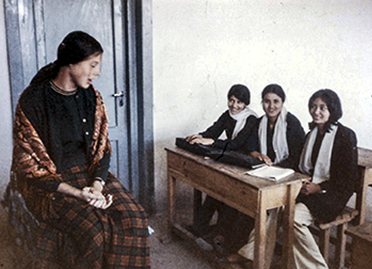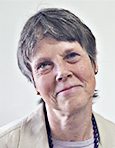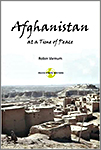Talking with Robin Varnum (Afghanistan)
In June, Robin Varnum published her Peace Corps memoir Afghanistan at a Time of Peace. Peace Corps Worldwide asked Robin about her service, and about the writing and promoting of her book.
•
Robin, where and when did you serve with the Peace Corps:
I served in the Peace Corps in Afghanistan (1971-1973), and taught English (grades 8-12) in a girls school.
Where did you live and work?
I lived in Ghazni, a small city around 85 miles southwest of Kabul. I taught at Lycée Jahan Malika, the only girls school in either the city or the province of Ghazni. At the time, it served around 400 girls from kindergarten through 12thgrade.
What kind of work did you do?

Robin with several students, 1972
I taught English. Although I did not understand initially why my students needed to learn English, I soon saw that a knowledge of English could open doors for students with serious ambitions. It was necessary, for example, for those who wished to study at Kabul University or to qualify for scholarships to study in English-speaking countries.
What else did you do?
I helped design, type, and mimeograph English exams for schools throughout Ghazni province. I tutored the female doctor who ran Ghazni’s Family Planning Clinic. I tried to promote an appreciation of the value of women’s education. I hoped to help my students gain access to the kinds of opportunities that were available to other girls in other parts of the world.
What is your educational background?
When I joined the Peace Corps, I had only a Bachelor’s Degree (1971) from William Jewell College in Missouri. Subsequently, I earned a Master’s (1977) in English from the University of Washington and a doctorate (Ed.D., 1992) in Education from the University of Massachusetts at Amherst.
Did your college education help you as a PCV?
Yes, it helped me with my teaching. I also appreciated the stature it gave me as an educated woman. My Bachelor’s degree was in philosophy, and when I joined the Peace Corps, I had never taught before, but my prior experience as a college student helped me in the classroom.
What have you done since the Peace Corps?
I have made a career of teaching English, both composition and literature. For many years, I taught as an adjunct professor. But in 2004, I was hired as an Assistant Professor at American International College in Springfield, Massachusetts. From 2005 to 2016, I chaired the English department at AIC. I retired with the rank of Professor in 2016, but I continued to teach as an adjunct for four more years. I now hold the rank of Professor Emerita at AIC.
I also published three other books prior to -Afghanistan at a Time of Peace. The other three are:
-
- Fencing with Words: A History of Writing Instruction at Amherst College during the Era of Theodore Baird, 1938-1966,
National Council of Teachers of English 1996 - The Language of Comics: Word and Image, University Press of Mississippi 2001
- Álvar Nuňez Cabeza de Vaca: American Trailblazer, University of Oklahoma Press, 2014
- Fencing with Words: A History of Writing Instruction at Amherst College during the Era of Theodore Baird, 1938-1966,
What are you doing now?
 I retired completely from teaching in the spring of 2020. Since then, I have been working on Afghanistan at a Time of Peace, and helping my grandchildren with their virtual schooling. I am active in my church, and I enjoy cooking and hiking. I enjoy travel too, but the pandemic has temporarily halted that.
I retired completely from teaching in the spring of 2020. Since then, I have been working on Afghanistan at a Time of Peace, and helping my grandchildren with their virtual schooling. I am active in my church, and I enjoy cooking and hiking. I enjoy travel too, but the pandemic has temporarily halted that.
How would you describe your book in one sentence?
Although Afghanistan has now endured more than forty years of continuous warfare, when Robin Varnum served there as a Peace Corps volunteer in the early 1970s, the country was enjoying an interlude of peace that, Varnum hopes, will someday be restored.
What prompted you to write Afghanistan at a Time of Peace?
 Afghanistan at a Time of Peace became my retirement project, but although I retired in 2016, I did not begin working on the book until 2017.
Afghanistan at a Time of Peace became my retirement project, but although I retired in 2016, I did not begin working on the book until 2017.
In 2001, I opposed George W. Bush’s intervention in Afghanistan, and at that time I wrote an article expressing my opposition, which was published first in my campus newspaper at American International College and then in The Chicago Tribune. It also aired on my local National Public Radio station. Subsequently, I became concerned when Presidents Obama, Trump, and Biden pushed for the withdrawal of U.S. and NATO forces from Afghanistan. I worried about what would happen to the Afghan people, and particularly the Afghan women, if the U.S. and its allies withdrew. I thought that a book throwing positive light on Afghanistan and its people might persuade a few Americans that the Central Asian country deserves continued American support.
How long did it take for you to write Afghanistan at a Time of Peace?
In some ways, my project began in 1979 when I was on maternity leave with my firstborn and made a project of making a scrapbook of memorabilia from Afghanistan, including student papers, newspaper clippings, and Christmas greetings from President and Mrs. Nixon. This scrapbook was very useful to me when I was writing my
book.
The book really began, however, when I had knee-replacement surgery in May of 2017. While I was recovering from that, I made it a project to digitize the handwritten letters I had sent to my mother from Afghanistan, and which she saved. I wanted to be able to share the digital copies with my daughters.
That prompted my husband, Juris Zagarins, who served as a PCV in Ghazni, Afghanistan at the same time I did, to translate and digitize the letters he sent from Afghanistan to his parents. He had written to his parents in Latvian, their home language, so he had to translate his letters into English to make them accessible to our daughters and me.
Thus, with two sets of letters at my disposal, I began to think of weaving them together into a coherent narrative. Juris supported me in this project, and he has collaborated with me every step of the way. The book is illustrated with his photos. Juris also designed both the paperback and the Kindle versions of the book. Juris and I met in Afghanistan, and in many ways, the book tells the story of how we became a couple.
Tell about your writing process.
I write at my computer, and I write almost every day for around four hours per day. I had the two sets of digitized letters saved to my hard drive, so I was able to toggle back and forth between the letters and my evolving narrative. Meanwhile, I read extensively about the history of Afghanistan. I also e-mailed various friends whom we knew in Afghanistan, both Afghans and RPCVs, in order to check their memories against my own.
During the process of writing the book, did you belong to a writers group?
Yes, actually I belong to two. The first consists of several of my former colleagues from American International College. The second is a group organized under the aegis of the Five College Learning in Retirement program to which I belong. During the time of the pandemic, both groups met via ZOOM. Participants exchanged drafts of their work via e-mail in advance of each meeting.
What are you doing to promote your book?
I have ordered copies for family and friends. I have posted announcements of the publication of my book on both Facebook and LinkedIn. I sent a copy to Jan West, the editor of Afghan Connections, which is published by Friends of Afghanistan, the alumni organization for RPCVs from Afghanistan. I have arranged to give a short presentation about the book at the July meeting of Western Massachusetts RPCVs.
I am currently in the process of supplying promotional material and
information to Peace Corps Worldwide. I am attempting to donate a copy of my book to the American University Library’s Peace Corps Community Archive. I plan to provide promotional material to the editors of Lucent, the alumni magazine of American International College, to the Springfield Republican newspaper, and to NEPM our local National Public Radio station.
I will also publicize my book through Amazon. I have already created an Amazon Author’s Page. I think that the current interest in Afghanistan, given the 20-year U.S. presence there and the immanence of U.S. withdrawal, will enhance the appeal of my book. I think the fact that I was a woman teaching in a girls school in Afghanistan will also appeal to readers.
What contacts do you have with Afghans you knew when you served in Afghanistan?
None in Afghanistan, but several in the United States, Canada, and Australia.
Do you know of Afghans who lost their lives during the wars that have consumed the country since 1979?
Yes, two. One was our instructor during training. The other was my husband’s student and a frequent visitor in our home.
What do you fear will happen in Afghanistan after the U.S. and NATO forces withdraw?
I fear the country will again be engulfed in chaos and civil war. I fear women will again be denied access to education.
•
Afghanistan at a Time of Peace
by Robin Varnum (Afghanistan 1971–73), Photographer: Juris Zagarins (Afghanistan, 1971-1974)
Peace Corps Writers
201 pages
June 2021
$25.00 (paperback), $10.00 (Kindle)
I share the same fears as Dr. Varnum that the women will not just be denied an education but that many will become victims of violence. Her book is indeed timely.
Congratulations Robin Varnum in publishing your combined memoir and account of an all-too-short-lived period of peace in Afghanistan. I look forward to reading it and share your hope that the people of Afghanistan can work together to establish peace in their rugged land, though I admit the past behavior of local warlords-turned-politicians is not encouraging. However, as we learned through the Peace Corps experience, never underestimate the durability of people’s hope.
Best wishes,
Vic Cox
Brazil 1964-66